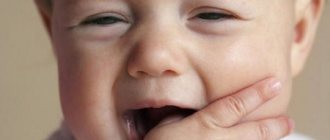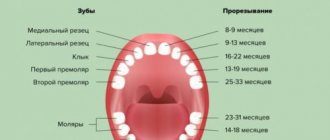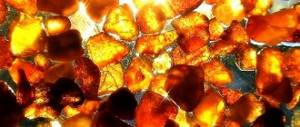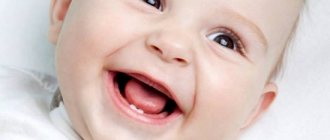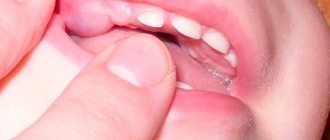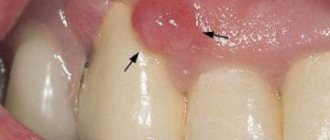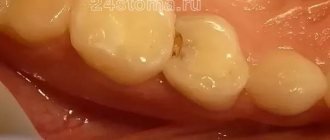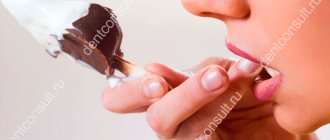What are the dangers of premature removal of baby teeth?
Speech disturbances, inhibited bone growth and unnecessary pain are just some of the unpleasant consequences of not properly caring for baby teeth. Some parents mistakenly believe that there is no need to worry about baby teeth if they fall out anyway. Premature loss of primary teeth, that is, 3-4 years before the date of their physiological loss, in adulthood leads to unpleasant consequences - crowding or various types of malocclusion.
Baby teeth have a specific structure and are very susceptible to caries. Their premature loss is most often caused by advanced caries or mechanical injuries. If primary teeth begin to deteriorate, inflammation of the pulp quickly occurs, and then inflammation easily occurs with complications around the periapical tissues or abscesses. In such cases, it is often impossible to perform root canal treatment. All that remains is to remove the baby tooth. The whole process of pain and treatment exposes the baby to many troubles, and it is worth protecting him from this.
Why does vomiting occur during teething?
Parents often attribute vomiting to teething, but these symptoms are usually unrelated. An analysis of studies in eight countries found that teething may cause discomfort in babies, but is unlikely to cause vomiting. Parents simply may not notice the true cause of the disease. Typically, a baby's teething occurs at a time in life when he is exposed to childhood diseases. Also during this period of time, the passive immunity that the mother transmitted in the womb decreases. It is likely that vomiting during this time is caused by a bacterial or viral infection. Several illnesses can cause a child to vomit:
- ARVI or flu;
- ear infections;
- gastroenteritis or other stomach infection;
- kidney infection.
Sometimes food allergies or intolerances can cause vomiting. Vomiting is usually not a cause for concern and goes away quickly. However, your child can be helped if:
- give more water;
- provide peace;
- resume normal diet 12-24 hours after the last vomiting.
Why do baby teeth deteriorate?
Damage to a baby tooth most often occurs due to caries in early childhood. This disease can take different forms. The wrong way to feed a baby can lead to bottle tooth decay. If the baby falls asleep with a bottle in his mouth or is given formula or sweet tea after waking up at night, then streptococcal bacteria develop in the mouth during sleep. They are the ones who contribute to the occurrence of this variant of the disease.
In older children, two and three years of age, circular caries is observed. This is the name of the early stage of caries with an acute course. It first begins to attack the front teeth, most often in the upper jaw and symmetrically on both sides, and then leads to pulp complications. A tooth with a damaged crown is not suitable for root canal treatment and must be removed. Leaving a baby tooth damaged by caries is dangerous because it is an inflammatory source in the child’s mouth.
Another very common cause of loss of baby teeth is childhood trauma. It is not uncommon for a child to lose teeth due to a fall. One of the main reasons is that the design of primary incisors is completely different from permanent incisors. They are smaller, have shorter roots, and the jaw bones are more spongy. Children of certain ages are at greater risk of injury:
- the first and second years of life are when they are just learning to walk, but the older the child, the greater the risk;
- later, at the age of four to six, other activities appear: playing with a ball, running, climbing.
So it is not difficult to lose a tooth. Often, the premature loss of baby teeth in children is not given much attention. However, the roots of an extracted baby tooth are usually not completely resorbed, and the root of a permanent tooth is still in the early stages of development. This has quite serious consequences, so the indications and contraindications for removal should not be ignored.
Why does a baby refuse complementary foods? No appetite, teething or sick?
Complementary feeding is a kind of food stress for the baby. After all, he is accustomed to breast milk or formula, but they are trying to “feed” him something hitherto unprecedented and incomprehensible in all respects.
Problems with complementary feeding arise mainly for two reasons: due to the nuances of the child’s psychological mood and health status, or when something is wrong with the food itself. Actually, from the baby’s point of view, even with perfectly prepared complementary foods, everything is not the same: it has a different taste, and the consistency is not the same, and the temperature is also not like milk! Babies actively protest against everything new, especially in food, and nothing can be forced on them: subtle methods and special approaches are required.
Refusal to feed: bad mood or illness
A baby's lack of appetite may be due to their mood. You cannot introduce him to complementary foods when he is crying, anxious or unhappy about something, or when he is overexcited. First you need to calm the baby down, and only then introduce him to new food. Your task is to teach him to enjoy a new dish, to eat slowly and with taste.
To begin, sit the baby on your lap, gently saying in a cheerful voice: “Let's have lunch. Try how delicious the puree is!” Even if he doesn’t understand the words, he will immediately sense your mood based on your joyful intonation and conclude: he is being offered something extremely wonderful!
Do you know that your baby has health problems? Does he have a runny nose, fever, worsened diathesis, tormented by colic, teething, white films in his mouth, indicating candidal stomatitis? Then it’s clear why he refuses complementary foods! When children are sick, the secretion of digestive enzymes and juices slows down. This is understandable, because now the body has no time for food, it is throwing all its strength into fighting the disease. The child even sucks milk without appetite, and you offer him porridge or puree! Complementary foods cannot be introduced at this time.
It is a fact
Most babies aged 4–6 months are already ripe for the transition to new foods, since the child’s body prepares in advance for the introduction of complementary foods. So, from three months the baby’s stomach begins to increase the production of hydrochloric acid. In the fourth or fifth period, the production of pepsin and other digestive enzymes that break down proteins increases. And the activity of amylase, which is responsible for the absorption of complex carbohydrates, increases already in a two-month-old baby.
Problems with complementary feeding: too thick food
A baby who has never tried anything other than milk or formula cannot swallow purees. Some babies get it right away, while others need to be taught. To help the baby, do this: first let him suckle a little, then put a little puree on his tongue and immediately give the breast again - the child will make the usual swallowing movement and, as it were, wash down the puree with milk. And after a few such “lessons” he will begin to swallow it himself.
The first portions of puree should be well pureed, but gradually make the complementary foods thicker, do not puree the vegetables, but mash them with a fork. The baby must learn to chew: the lack of this skill subsequently becomes an obstacle to eating. After all, if this “science” is not taught to him in time, the slightest lump of food, and especially a hard piece, will make him choke or even cause vomiting. And this will scare the baby and make him refuse complementary foods.
A convenient moment for learning to chew is teething. At this time, the baby is bothered by itchy gums, and he readily puts anything in his mouth. Give him a cracker - it will be both a gum massager and a teaching aid.
When at least two teeth appear, try putting a piece of boiled carrot or a small piece of cauliflower next to the puree, and let the child take it himself. And when he gets four teeth, instead of applesauce, you can give him a quarter of a peeled apple without seeds. A little later, replace the meat puree with meatballs and meat cutlets.
Baby refuses complementary foods: wrong taste and color
Mom's milk tastes sweet, just like formula. But there is no sweetness in mashed potatoes; on the contrary, it is recommended to add a little salt so that the baby develops the right taste. True, if you overdid it with salt in vegetable puree or gave your little one juice that turned out to be too sour, he is absolutely right in his protests. But it happens that kids don’t even like scientifically prepared purees. In this case, try diluting it with breast milk - the familiar taste will make the unfamiliar dish more familiar.
Does your baby spit out the puree? This happens when they start adding carrots, beets, and green peas to potatoes. The taste and color of food changes, and these changes are scary. Some kids don't recognize vegetables at all at first. In such cases, you can resort to a trick by offering the child the so-called colored porridge, adding carrots or pumpkin to the porridge, which he usually eats with pleasure, at first just a little, and then gradually increasing the proportion of vegetables. Cottage cheese can first be mixed with fruit puree, meat puree with vegetable puree.
And all this should be given before breastfeeding: while the baby is hungry, he will be more willing to eat a new dish.
Refusal of complementary feeding: immaturity of the body
Sometimes the maturation of the enzyme systems of the stomach and intestines may be delayed in an infant, and then attempts to give him juice or fruit puree will lead to a “revolution” in the tummy, accompanied by colic and diarrhea. It is clear that the baby will protest against innovations that make him feel bad!
Another possibility is also possible: the child has one of the variants of the so-called disaccharidase deficiency - intolerance to sugars contained in fruits. Most often it is temporary and does not require special treatment. You just need to postpone the introduction of juices and fruit and berry purees for a couple of months. Wait until the end of the first half of the year: until this time, mother’s milk generally meets the baby’s needs, so if necessary, he can do without any supplements.
And then start complementary feeding with vegetable puree and cereals (in accordance with the recommendations of your pediatrician), and only then introduce fruit puree, and then juice. For a child with enzymatic immaturity, this order is often the best. Start getting acquainted with fruits in small portions with the most harmless one - a baked apple with green skin (Simirenko, white filling). If everything goes swimmingly, try to gradually expand your fruit assortment.
Novelty effect
To make your baby love complementary foods, use little tricks during feeding.
- It is known that children are not indifferent to serving, so try to provide your child with bright, beautiful dishes with interesting pictures. Then the new food will seem more tasty to him.
- But at the same time, you should not change the table setting often: the little one likes to see on the table what he is used to. Remember that feeding can go down the drain because of a new cup or plate!
- Introducing complementary foods will be more fun if the baby participates more actively in it. The time for drinking from a bottle is over: the baby must learn to drink juice from a cup, holding it with both hands with mother's help.
- When introducing puree and porridge into complementary foods, invite your baby to take a spoon. The first thing he will do, of course, is start banging it on the table, waving it around, or even dropping it on the floor. But gradually he will learn to use it for its intended purpose.
- Introduce your child to a napkin - during feeding, wipe his mouth and chin, do not let the little eater sit with a smeared face. In general, teach him to eat beautifully in the first year of his life!
Doctor's advice
Remember that a baby’s appetite reacts poorly to anything unusual: for example, an unusual smell is a good reason for him to refuse a dish. The change of environment also unnerves the baby: he was breastfed in the room, but they began feeding him in the kitchen, breaking the usual ritual and stereotype of eating. The baby is already uncomfortable in a different interior, and here they are still trying to feed him who knows what. How can one not be outraged? That is why, a week before the introduction of complementary foods, it makes sense to move the baby’s feeding place to the kitchen or dining room - to where he will eventually eat like a big one.
Removal of baby teeth in children
It all depends on the number of lost baby teeth, their location in the jaw and how much time is left before the permanent tooth erupts. If it is three or four years, the more likely it is that the permanent tooth will be delayed or will not grow. The hard and compact bone tissue formed above the tooth germ will be difficult for him. The opposite is true when the time to a supposedly permanent dentition is quite short. Then the eruption of the permanent tooth usually occurs earlier than it would have happened naturally.
Premature loss of primary teeth can also interfere with alveolar bone growth. A child who does not have teeth cannot bite properly, and the forces generated during this activity are not transmitted to the bones and muscles, which does not contribute to their proper development.
Losing two baby teeth on one side, such as the fourth and fifth, can lead to other consequences. With such extensive missing teeth, the occlusal forces between teeth that shape and guide the growth of the alveolar bone are compromised. Thus, growth is uneven and is expressed in the vertical layering of bone where there are no teeth.
Premature loss of a molar, that is, the primary five, always leads to an internal (i.e. forward) displacement of the fixed six. This is a common problem that causes the dental arch to shrink. As a result of this phenomenon, there may not be enough space for other molars. Consequently, crowding of teeth occurs, this feature looks unsightly when there is no room for the canine tooth and it grows outside the dental arch or does not grow at all because due to lack of space, it gets stuck in the bone.
Premature loss of incisors and primary canines, that is, the upper front teeth, contributes to poor jaw bone development, which can lead to malocclusion. For example, if the jaw is underdeveloped compared to the lower jaw, an anterior transverse bite will form (the lower front teeth will overlap the upper ones).
Speech problems may occur in children with severely defective primary teeth, especially the front incisors. Such deficiencies do not contribute to the correct position of the tongue on the palate, so there is a possibility of interdental lisp. As a rule, after the removal of a baby tooth, a child needs 1-2 years of visiting a speech therapist or dentist.
Missing teeth and speech defects not only affect health, but also have a psychological aspect: the child may have low self-esteem, be secretive or shy because of his appearance. Children's baby teeth are truly worth caring for. Oral hygiene is equally important at every stage of life.
Teething symptoms
Typical symptoms of teething:
- chewing objects;
- the child cries more than usual;
- restless sleep;
- salivation;
- irritability;
- loss of appetite;
- sore gums;
- slight increase in body temperature.
The study results show that symptoms begin when the front teeth erupt. Over time, the symptoms weaken.
Teething does not usually cause the following symptoms, such as:
- cough;
- diarrhea;
- heat;
- refusal of water;
- vomit.
Treatment of baby teeth by a doctor
Just like adults, children's baby teeth are susceptible to caries. The treatment in the clinic is similar to the treatment of permanent teeth, with the difference that you can use special plastic fillings for baby teeth in white or many other colors. In addition to the temperature, premature removal of a baby tooth can distort the growth of the upper or lower jaw, cause insufficient space in the arch for permanent teeth, or damage their buds. This is why it is so important that the baby tooth remains in the mouth until natural tooth replacement occurs.
As permanent teeth erupt, baby teeth tend to move around a lot. This may be accompanied by purulent inflammatory processes. Then it is better to remove the baby tooth. When the first permanent molars appear, it is worth considering dental fillings. The procedure consists of fixing them with a special varnish that protects them from rotting. The treatment is completely non-invasive and painless. The optimal time for placing fillings is about 6 years.
When to see a doctor?
You should call a doctor if vomiting is accompanied by the following symptoms, such as:
- fever;
- the appearance of a rash;
- refusal to take fluids;
- severe irritability;
- shortness of breath;
- signs of dehydration;
- sleep more than usual;
- bloated belly.
You should see a doctor if vomiting continues for more than 12 hours or if the vomiting is intense.
If your baby is experiencing typical teething symptoms, they can be treated at home. Treatments include:
Wipe away drool
. Excessive drooling can cause skin irritation. Use a clean cloth to gently remove excess saliva from the chin and mouth area. Applying a cream or ointment will soothe irritated skin.
Gum massage
. Gently rub your gums with a clean finger or moistened gauze to relieve pain and discomfort.
Cooling
. Place a cold compress, chilled spoon, or teething ring on your gums.
Give solid foods
. Babies eating solid foods may find relief from chewing a piece of cucumber or carrot. Be careful that your child does not choke on small pieces of food.
Painkillers
. Acetaminophen (Paracetamol) and Ibuprofen (Nurofen, etc.) are usually prescribed. Do not use painkillers for more than one to two days without consulting your doctor.
Avoid medications containing Belladonna, Lidocaine or Benzocaine. They can be dangerous if a child swallows them. Doctors do not recommend drugs, herbs or homeopathic remedies for teething due to their potential side effects. Seek medical help immediately if your child experiences:
- labored breathing;
- difficulty urinating;
- lethargy;
- muscle weakness;
- seizures.
